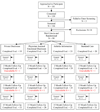A randomized, controlled trial of emotional disclosure in rheumatoid arthritis: can clinician assistance enhance the effects?
- PMID: 17923329
- PMCID: PMC2516446
- DOI: 10.1016/j.pain.2007.08.031
A randomized, controlled trial of emotional disclosure in rheumatoid arthritis: can clinician assistance enhance the effects?
Abstract
Emotional disclosure by writing or talking about stressful life experiences improves health status in non-clinical populations, but its success in clinical populations, particularly rheumatoid arthritis (RA), has been mixed. In this randomized, controlled trial, we attempted to increase the efficacy of emotional disclosure by having a trained clinician help patients emotionally disclose and process stressful experiences. We randomized 98 adults with RA to one of four conditions: (a) private verbal emotional disclosure; (b) clinician-assisted verbal emotional disclosure; (c) arthritis information control (all of which engaged in four, 30-min laboratory sessions); or (d) no-treatment, standard care only control group. Outcome measures (pain, disability, affect, stress) were assessed at baseline, 2 months following treatment (2-month follow-up), and at 5-month, and 15-month follow-ups. A manipulation check demonstrated that, as expected, both types of emotional disclosure led to immediate (post-session) increases in negative affect compared with arthritis information. Outcome analyses at all three follow-ups revealed no clear pattern of effects for either clinician-assisted or private emotional disclosure compared with the two control groups. There were some benefits in terms of a reduction in pain behavior with private disclosure vs. clinician-assisted disclosure at the 2-month follow-up, but no other significant between group differences. We conclude that verbal emotional disclosure about stressful experiences, whether conducted privately or assisted by a clinician, has little or no benefit for people with RA.
Figures
Similar articles
-
Does emotional disclosure about stress improve health in rheumatoid arthritis? Randomized, controlled trials of written and spoken disclosure.Pain. 2011 Apr;152(4):866-877. doi: 10.1016/j.pain.2011.01.003. Pain. 2011. PMID: 21315515 Free PMC article. Clinical Trial.
-
The working alliance and Clinician-assisted Emotional Disclosure for rheumatoid arthritis.J Psychosom Res. 2018 Jan;104:9-15. doi: 10.1016/j.jpsychores.2017.11.004. Epub 2017 Nov 7. J Psychosom Res. 2018. PMID: 29275791
-
The health effects of at-home written emotional disclosure in fibromyalgia: a randomized trial.Ann Behav Med. 2006 Oct;32(2):135-46. doi: 10.1207/s15324796abm3202_11. Ann Behav Med. 2006. PMID: 16972811 Free PMC article. Clinical Trial.
-
Folic acid supplementation and malaria susceptibility and severity among people taking antifolate antimalarial drugs in endemic areas.Cochrane Database Syst Rev. 2022 Feb 1;2(2022):CD014217. doi: 10.1002/14651858.CD014217. Cochrane Database Syst Rev. 2022. PMID: 36321557 Free PMC article.
-
Emotional disclosure interventions for chronic pain: from the laboratory to the clinic.Transl Behav Med. 2012 Mar;2(1):73-81. doi: 10.1007/s13142-011-0085-4. Transl Behav Med. 2012. PMID: 22905067 Free PMC article. Review.
Cited by
-
Non-pharmacological treatment in difficult-to-treat rheumatoid arthritis.Front Med (Lausanne). 2022 Aug 29;9:991677. doi: 10.3389/fmed.2022.991677. eCollection 2022. Front Med (Lausanne). 2022. PMID: 36106320 Free PMC article. Review.
-
Does emotional disclosure about stress improve health in rheumatoid arthritis? Randomized, controlled trials of written and spoken disclosure.Pain. 2011 Apr;152(4):866-877. doi: 10.1016/j.pain.2011.01.003. Pain. 2011. PMID: 21315515 Free PMC article. Clinical Trial.
-
Psychologic interventions and lifestyle modifications for arthritis pain management.Rheum Dis Clin North Am. 2008 May;34(2):351-68. doi: 10.1016/j.rdc.2008.03.001. Rheum Dis Clin North Am. 2008. PMID: 18638681 Free PMC article.
-
The effects of different methods of emotional disclosure: differentiating post-traumatic growth from stress symptoms.J Clin Psychol. 2011 Oct;67(10):993-1007. doi: 10.1002/jclp.20750. Epub 2010 Nov 22. J Clin Psychol. 2011. PMID: 21905025 Free PMC article. Clinical Trial.
-
The effects of written emotional disclosure and coping skills training in rheumatoid arthritis: a randomized clinical trial.J Consult Clin Psychol. 2014 Aug;82(4):644-58. doi: 10.1037/a0036958. Epub 2014 May 26. J Consult Clin Psychol. 2014. PMID: 24865870 Free PMC article. Clinical Trial.
References
-
- Anderson KO, Bradley LA, McDaniel LK, Young LD, Turner RA, Agudelo CA, Keefe FJ, Pisko EJ, Snyder RM, Semble EL. The assessment of pain in rheumatoid arthritis: validity of a behavioral observation method. Arthritis and Rheumatism. 1987;30:36–43. - PubMed
-
- Anderson KO, Keefe FJ, Bradley CA, McDaniel LK, Young LD, Turner RA, Agudelo CA, Semble E, Pisko EJ. Prediction of pain behavior and functional status of rheumatoid arthritis patients using medical status and psychological variables. Pain. 1988;33:25–32. - PubMed
-
- Anderson T, Carson KL, Darchuk AJ, Keefe FJ. The influence of social skills on private and interpersonal emotional disclosure of negative events. J Soc Clin Psychol. 2004;23:635–642.
-
- Angus LE, Levitt H, Hardtke K. The narrative process coding system: Research applications and implications for psychotherapy practice. J Clin Psychol. 1999;55:1255–1270. - PubMed
-
- Brantley PJ, Waggoner CD, Jones GN, Rapaport NB. A daily stress inventory: Development, reliability, and validity. J Behav Med. 1987;10:61–74. - PubMed
Publication types
MeSH terms
Grants and funding
LinkOut - more resources
Full Text Sources
Medical


